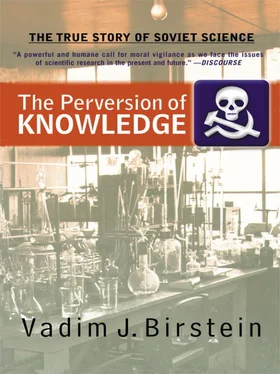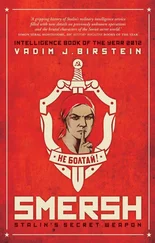The conditions in Vladimir Prison in the late 1940s to early 1950s were extremely severe, sometimes almost unbearable. As a former numbered prisoner, Ariadna Balashova, arrested in 1947 in the Allilueva case, told me in 1990, after years in solitary confinement, people forgot how to speak and had to learn to pronounce words again. Others went insane. For a tiny violation of the strict prison rules, a prisoner was put in a punishment cell, or kartser . Thomas Sgovio, an American who had already been through the most brutal Soviet labor camps and then spent four months in Vladimir Prison, 73described in his memoirs his experience of having been kept in such a cell in 1949:
Three days in the dungeon… undressed… in my underdrawers… four hundred grams of bread and a cup of water… it’s cold and damp… pace back and forth to keep warm… all day. Night… they give me a board to sleep on… I lay down… it’s too cold… I hug my sides… no use. Get up, Tommy… walk back and forth… re-live your life again. 74
The system of numbered prisoners ended in December 1954. 75However, those sentenced as members of the Allilueva case were given their real names back and released earlier, in 1953. Also, at the end of 1954, prisoners were given their own clothes instead of the gray uniforms with dark blue stripes introduced in 1948. 76The length of time allowed for daily walks in the high-walled pen in the prison’s yard became longer, about thirty minutes instead of fifteen.
It does not appear that Mairanovsky was kept in the most severe conditions: There is a note on his prisoner’s card that in 1953 he was put in the building with mild conditions (into cells of Corpus 3; Documents 16 and 17, Appendix II). Besides Mairanovsky, there were a few other men in Vladimir who had held high positions in Beria’s MGB. According to the memoirs of a dissident and former political prisoner, Revolt Pimenov, these Beria men seemed to have received more lenient treatment than other prisoners. 77A Leningrad mathematician, Pimenov was arrested in 1957, tried on political charges, and sentenced for the first time in February 1958, 78the year in which Khrushchev boasted that there were no political prisoners in the USSR. After enduring six years of his ten-year term, Pimenov was released due to the intervention of two prominent mathematicians, Academicians Aleksandr Aleksandrov and Mstislav Keldysh. Refused permission to return to Leningrad, Pimenov worked at an institute in the city of Syktyvkar in the northern part of European Russia, where he was elected as a deputy of the Soviet Parliament in 1989. He died in 1990.
According to the memoirs of Eitingon’s stepdaughter, Zoya Zarubina (like him, she was also an MGB officer), Eitingon’s family was allowed to visit him in Vladimir Prison “once a month, and this was when they took the food parcel… Leonid also sent a letter to the family each month.” 79The other prisoners did not recall such privileges.
Pimenov remembered Mairanovsky as a pretentious prisoner. During the short walks in the prison yard, Mairanovsky wore a general’s military hat, even on warm days. He was not a general (before his arrest Mairanovsky held the rank of a colonel), but he wanted to be recognized as one. This was ridiculous in those circumstances, since prisoners were deprived of their ranks and awards.
Pimenov recalled another episode. On April 12, 1961, when almost everybody was exulting after the news of Gagarin’s space flight, Mairanovsky yelled at Pimenov: “Why don’t you smile? You don’t like the achievements of the Soviet country, do you?” 80Eitingon’s stepdaughter recalled that Eitingon in prison also remained “a staunch Communist who believed in the system.” 81
In 1990, I myself went to Vladimir Prison as part of an international team of researchers, the Commission on the Fate and Whereabouts of Raoul Wallenberg. Incredibly, the former medical doctor of the Vladimir Prison hospital, Elena Butova, clearly remembered Mairanovsky. She could not forget his words. One day, when he needed some medical treatment and saw a syringe in her hands, Mairanovsky began to shriek: “Do not come up to me! You want to kill me! I know how it could be done!”
On June 7, 1953, Mairanovsky was moved from Vladimir Prison to Lubyanka Prison, Moscow. Evidently this happened after he appealed to the new state security (now MVD) minister, Beria, in a letter dated April 21, 1953. After Stalin’s death, in March 1953, Beria merged the MGB and MVD into the new MVD. He also ordered the release of many of his former trusted coworkers who had been imprisoned during the anti-Semitic purges of 1951–1952. 82Among others, Eitingon, Sverdlov, Matusov, and Raikhman were released. Eitingon and Raikhman received high appointments in the new MVD. 83Sverdlov also returned to the MVD. Mairanovsky wrote Beria a second time on July 17, 1953, while he was in Butyrka Prison in Moscow. 84However, it was too late—Beria had already been arrested.
On June 26, Lavrentii Beria, the ruthless head of the new MVD, was arrested by the members of the Presidium of the Communist Party at its session (Table 3.2). This plot was led by Nikita Khrushchev. 85At the next session of the Presidium, on June 29, a resolution was adopted “On the Organization of the Investigation of the Affair of the Criminal Anti-Party and Anti-Government Activities of Beria.” After five secret sessions of the Communist Party Central Committee Plenum that took place on July 2–7, 1953, Beria was denounced at the Plenum along with his cronies. 86Sergei Kruglov, the newly appointed MVD minister, said at the Second Plenum Session:
Beria pursued the goal of having his own people in the field, without consideration for their political loyalty to the [Communist] Party. As is now clear, we must perceive a number of appointments of such people as Raikhman, Eitingon, Sudoplatov, Meshik, Milstein and others… who were expelled from the organs of the MVD prior to his appearance, as a desire to surround himself with people totally faithful to him. 87
After this, Merkulov and others close to Beria were arrested. Eitingon was arrested again on August 20, 1953. 88Sudoplatov was arrested in his own office the next day, August 21, 1953 (Sudoplatov’s prisoner card; Document 22, Appendix II), by the head of the MVD Seventh (Operative) Directorate and searched like a common criminal. 89After his arrest, Sudoplatov’s deputy, Lev Studnikov, became acting head of the Ninth Department, 90which was later renamed the Thirteenth Department and then Department V. In 1971, after the defection in England of Oleg Lyalin, an agent of this department, functions of Department V were given to Department S (illegal agents) of the KGB First Main (Foreign Intelligence) Directorate. 91
Table 3.2 Events Surrounding the Beria and Merkulov Trials
| Date in 1953 |
Event |
Source(s) |
| June 26 |
Beria’s secret arrest |
Stickle, The Beria Affair , p. 201 |
| June 29 |
Decision of the Presidium of the Central Committee to start Beria’s investigation |
Naumov and Sigachev, Lavrentii Beria, p. 72; Stickle, The Beria Affair , p. 201 |
| July 10 |
Official announcement of Beria’s arrest |
Andrew and Gordievsky, KGB, p. 424 |
| Aug. 20 |
Arrest of Eitingon |
Eitingon’s Prisoner Card |
| Aug. 21 |
Arrest of Sudoplatov |
Sudoplatov’s Prisoner Card |
| Aug. 27 |
Interrogation of Mairanovsky |
Bobryonev, “Doktor Smert,” pp. 365-368; Bobryonev and Ryazentsev, The Ghosts , p. 167 |
| Aug. 28 |
The first interrogation of Beria regarding Mairanovsky’s activity |
Bobryonev, “Doktor Smert,” pp. 368-371; Bobryonev and Ryazentsev, The Ghosts, pp. 151-153 |
| Aug. 29 |
Interrogation of Merkulov regarding Mairanovsky’s activity |
Bobryonev, “Doktor Smert,” pp. 234-235; Bobryonev and Ryazentsev, The Ghosts, pp. 164-166 |
| Sept. 1 |
Interrogation of Sudoplatov regarding Mairanovsky’s activity |
Bobryonev, “Doktor Smert,” pp. 388-389; Bobryonev and Ryazentsev, The Ghosts, p. 168 |
| Sept. 1 |
Interrogation of Beria regarding Mairanovsky’s activity |
Bobryonev, “Doktor Smert,” pp. 372-378; Bobryonev and Ryazentsev, The Ghosts, pp. 154-161 |
| Sept. |
Interrogation of Raikhman, Naumov, Grigorovich, Balishansky, Podobedov regarding Mairanovsky’s activity |
Bobryonev, “Doktor Smert,” pp. 380-381 398; Bobryonev and Ryazentsev, The Ghosts , pp. 129-131 |
| Sept. 19 |
Interrogation of Blokhin regarding Mairanovsky’s activity |
Bobryonev, “Doktor Smert,” pp. 390-391 396; Bobryonev and Ryazentsev, The Ghosts , pp. 129-131 |
| Sept. 23 |
Interrogation of Mairanovsky |
Bobryonev, “Doktor Smert,” pp. 232-233, 389; Bobryonev and Ryazentsev, The Ghosts , pp. 70-72, 169 |
| Sept. 29 |
Interrogation of Merkulov regarding Mairanovsky’s activity |
Bobryonev, “Doktor Smert,” pp. 234-235 385; Bobryonev and Ryazentsev, The Ghosts , pp. 72-74 , 128, 166-170 |
| Oct. 14 |
Interrogation of Gertsovsky regarding Mairanovsky’s activity |
Bobryonev, “Doktor Smert,” pp. 391-392 Bobryonev and Ryazentsev, The Ghosts, pp. 170-172 |
| Oct. |
Interrogation of B. Kobulov regarding Mairanovsky’s activity |
Bobryonev, “Doktor Smert,” pp. 392-394 Bobryonev and Ryazentsev, The Ghosts, pp. 172-174 |
| Oct. 23 |
Interrogation of Gertsovsky regarding Mairanovsky’s activity |
Bobryonev, “Doktor Smert,” p. 394; Bobryonev and Ryazentsev, The Ghosts, pp. 175-180 |
| Dec. 18-23 |
Trial of Beria, Merkulov, Kobulov and four other of Beria’s men |
Petrov, “Sudy protiv NKVD-MGB”; Stickle, The Beria Affair , pp. 195-197 |
| Dec. 23 |
Shooting to death Beria, Merkulov, Kobulov, and other convicts after the trial |
Petrov, “Sudy protiv NKVD-MGB”; Naumov and Sigachev, Lavrentii Beria, p. 387 |
Mairanovsky’s letter fell into the hands of an OVD investigator, Molchanov. He immediately wrote a report to the new head of the OVD Department, Lieutenant Colonel Kozyrev, who replaced Ryumin. In the report he described Mairanovsky’s laboratory and Beria’s leading role in its organization and supervision, 92stating that Mairanovsky’s case should be sent to the Chief Prosecutor’s Office. At this point, the Presidium of the Central Committee had already put the newly appointed chief prosecutor, Rodion Rudenko 93in charge of a team of prosecutors to investigate Beria and his men. 94
Читать дальше











